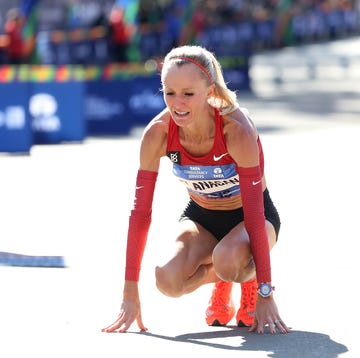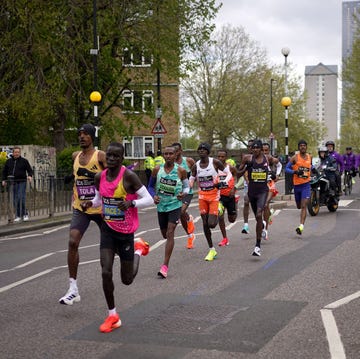Early season and you're on fire, unbeatable. You're nailing your workouts, feeling like a colt chomping at the bit to go faster.
This is going to be your year. Flash-forward a month or two and that ace of the oval seems like a person from a past life. Your legs feel like lead. The times that were a breeze before now take insurmountably more effort. You're close to dropping off the cliff, falling down the chasm that's end-of-season burnout. What happened to that early season runner?
"It can vary with different situations," says Cal Poly coach Kelly Strong. "Sometimes it can be an easy answer [like low iron], but it can also be a challenge. It is part of the game, though, and can be motivating to find out how to get [slowing runners] to feel better."
POSSIBLE CULPRITS
MEDICAL: A smart place to start is checking for physical culprits. Get blood work done and consult with your doctor to rule out common issues such as anemia or hypothyroidism. While you never want to wish an illness on yourself, sometimes a medical condition is the easiest to correct, enabling you to get back on track quickly.
How to catch yourself before you flat-line and wreck your season: Neglecting even one of the crucial areas of recovery can cause a nosedive in performance. Think nutrition, sleep and easy running. Refusing to keep your easy days in check will result in an overly fatigued state where all your days, hard workouts and easy runs, will soon become indistinguishable.
TOO EAGER: It may sound crazy, but there's such a thing as being too motivated. "Getting too excited early on" is a common error, Strong says. He calls for patience in the beginning stages of training. "We look at the early season races as stepping stones. Each race should build upon the last." While it's great to set lofty goals, you should achieve them at the end of the season. Just like pacing during a race, you want to go out smart, even err on the side of conservative, to make sure you have the reserves to find that extra gear come the late-stage push.
Health - Injuries: "I'm notorious for racing my workouts," admits 2012 national cross country champion runner Sara Hall. "I really enjoy running really hard, and I've been in the camp for a while that faster is better and a lot faster is even better, [but] I'm going to make a conscious effort to run my hard workouts at the appropriate energy level." It can be difficult to rein it in at times, but we need to remind ourselves that there has to be a distinct difference between workouts and races. Workouts, of course, should be hard, but you shouldn't be constantly redlining it; come race day you want to have the ability to take it up a notch. Eager athletes must be especially careful to control their long runs and tempo runs, which should make up the bulk of early season training.
MENTAL BURNOUT: The mental component of a racing season also needs to be addressed, especially for high school and collegiate athletes competing in a large number of meets. You can't go into every race with the same mindset. Aim to reserve that extra buzz of excitement for the championship meets at the end of the season. If you spend too much mental energy on the early season meets, you'll be too drained to find an extra gear come season's end.
Health - Injuries
If you're at the point of feeling overly tired, is there still hope for the season? "Sure, you can dig yourself out by not digging!" exclaims coach Jay Johnson. "Don't race; don't try to maintain your volume; lower your intensity; get a blood chemistry panel; hydrate; do easy runs and fast strides until you feel well, then start with just a gentle threshold workout. The problem is most runners don't have the patience to dig themselves out of the hole of fatigue."
That patience also takes an element of trust and belief in yourself that backing off will, in fact, bring you closer to your goal than will gutting it out and pressing onward. "It takes confidence and self-control, but I know it will pay off in the long run," Hall says.
This extends to having a mini-break mid-season. "Sometimes your body needs a day off. Recovery can play a vital role so it's beneficial to know when to take some easy days," Strong says. "Having some down time mid-season can really pay off in championship season."
A final piece of the puzzle is recognizing that every athlete is different. Getting to know yourself is all a part of racing and becoming the runner you want to be. "This is very dependent on the athlete," Johnson says, noting that there is "wide variability in terms of the optimal number of times to race--from person to person, and obviously, from event to event."
Caitlin Chock (caitchock.com), who set the then national high school 5K record (15:52.88) in 2004, works as a freelance writer and artist.













